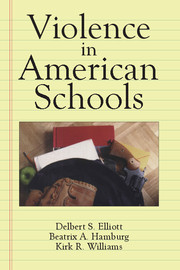Book contents
- Frontmatter
- Contents
- Acknowledgments
- List of contributors
- I INTRODUCTION
- II UNDERSTANDING CHILD AND YOUTH VIOLENCE
- III SCHOOL-BASED INTERVENTIONS
- IV COMMUNITY-BASED INTERVENTIONS
- 10 Exposure to Urban Violence: Contamination of the School Environment
- 11 Community Policing, Schools, and Mental Health: The Challenge of Collaboration
- 12 Tailoring Established After-School Programs to Meet Urban Realities
- V CONCLUSIONS
- Author index
- Subject index
10 - Exposure to Urban Violence: Contamination of the School Environment
from IV - COMMUNITY-BASED INTERVENTIONS
Published online by Cambridge University Press: 12 October 2018
- Frontmatter
- Contents
- Acknowledgments
- List of contributors
- I INTRODUCTION
- II UNDERSTANDING CHILD AND YOUTH VIOLENCE
- III SCHOOL-BASED INTERVENTIONS
- IV COMMUNITY-BASED INTERVENTIONS
- 10 Exposure to Urban Violence: Contamination of the School Environment
- 11 Community Policing, Schools, and Mental Health: The Challenge of Collaboration
- 12 Tailoring Established After-School Programs to Meet Urban Realities
- V CONCLUSIONS
- Author index
- Subject index
Summary
Introduction
This chapter examines how exposure to urban violence threatens the physical health, mental health, and educational effectiveness of those who learn, teach, and work in schools. Students, teachers, and other school staff may be exposed to urban violence in their neighborhoods, on their journey to and from school, in the school's neighborhood, or within the school itself. Whether occurring in a single setting or multiple settings, exposure to violence generates a sense of fear and leads to acts intended to reduce or control the fear. Exposure may also produce generalized emotional distress; disruptions in interpersonal relationships; problems with aggression; and, potentially, an array of cognitive, physical, and psychological dysfunctions. The effects of exposure experienced by some portion of a school's students, teachers, and staff may spread to others within that setting. As this “contagion” occurs, the school setting changes in ways that negatively alter the interactions among those within the school and that interfere with the school's capacity to achieve its educational and social goals.
In the past, community violence has been analyzed in terms of crime, using statistics (e.g., the Uniform Crime Report rates) to reveal the frequency and nature of criminal acts. These crime statistics clarify the forms of antisocial and violent behavior occurring within a setting; many of the socioeconomic, racial/ethnic, and family characteristics of both victims and perpetrators; the rates of physical injury and death associated with the violence; and the resources the community has invested in an attempt to control the violence (Lorion, Tolan, & Wahler, 1987). By contrast, this chapter focuses on the setting itself. To appreciate the public health implications of urban violence, one needs to understand the influence of the setting where violence occurs on the health and behavior of those exposed to these settings. (For information about a public health approach to preventing violence, see Chapter 2 of this volume.)
Definition of Terms
Before we begin, several key terms require definition. “Violence” refers to the intentional use, or threat to use force, to cause intentional injury, harm, or death to another. The qualifier “intentional” excludes from consideration injury and death resulting from unintended or accidental acts of violence.
- Type
- Chapter
- Information
- Violence in American SchoolsA New Perspective, pp. 293 - 311Publisher: Cambridge University PressPrint publication year: 1998
- 19
- Cited by

